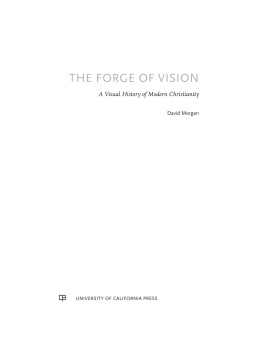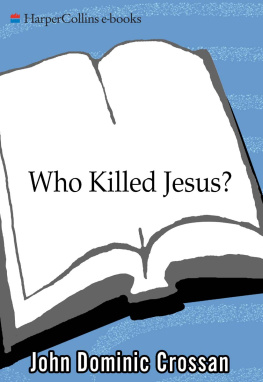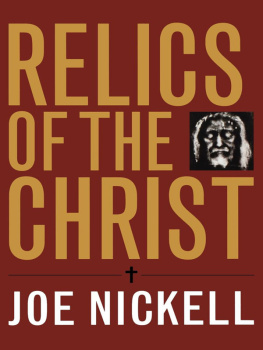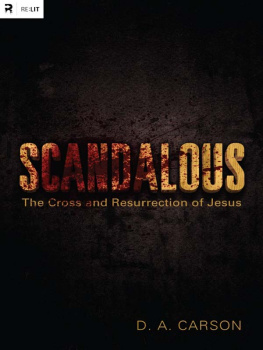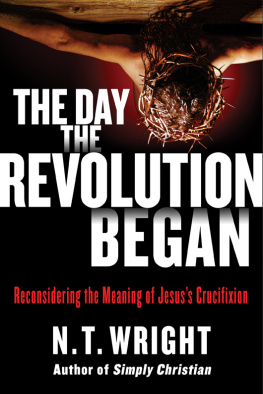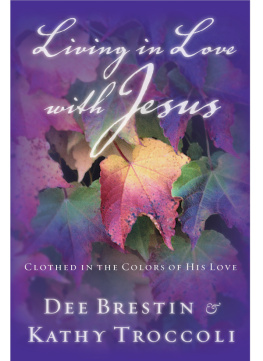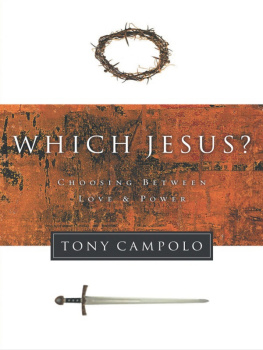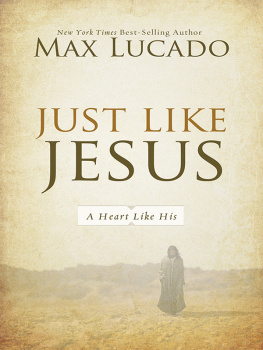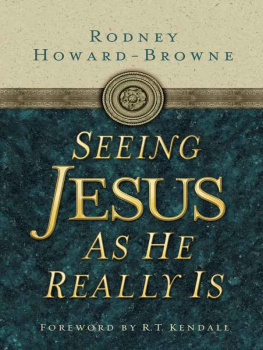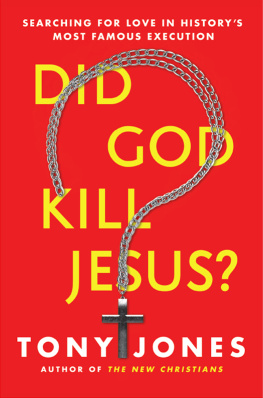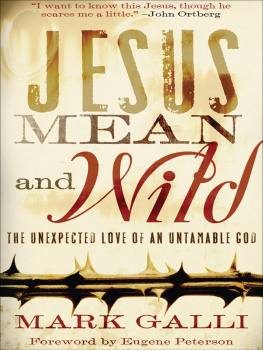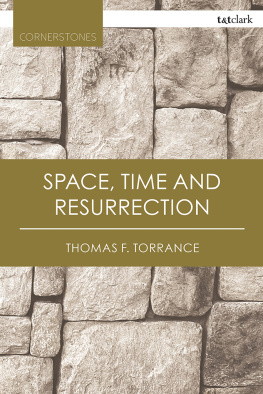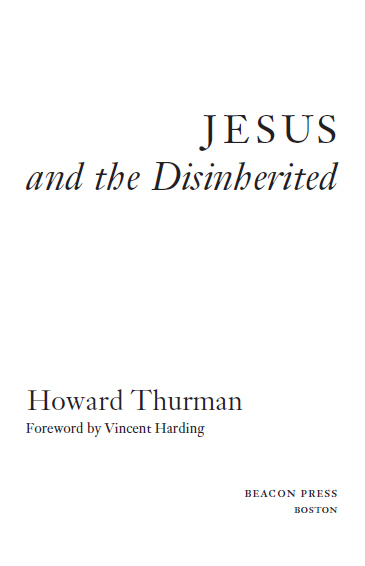
To
My Beloved Daughters
OLIVE and ANNE
and to the future of their generation in whom the struggles of the past will find fulfillment
Foreword
A superficial encounter with the title of Howard Thurmans classic statement, Jesus and the Disinherited , could easily lead us to anticipate a 1940s version of liberation theology, with its now familiar message that God is on the side of the oppressed, with its powerful and prophetic condemnation of the oppressors and their cruel systems of dehumanization, with its urgent calls to repentance, resistance, and hope. But nothing in Thurmans large and magnificently varied body of work ever yielded itself to superficial readings, and this invaluable half-century-old text is no exception.
For although it is possible to glean elements of a liberation theology from its pages, this richly endowed, seminal work can be more accurately and helpfully described as a profound quest for a liberating spirituality, a way of exploring and experiencing those crucial life points where personal and societal transformation are creatively joined. It is the centerpiece of the Black prophet-mystics lifelong attempt to bring the harrowing beauty of the African-American experience into deep engagement with what he called the religion of Jesus. Ultimately his goal was to offer this humanizing combination as the basis for an emancipatory way of being, moving toward a fundamentally unchained life that is available to all the women and men everywhere who hunger and thirst for righteousness, especially those who stand with their backs against the wall.
Stating his central intention in a slightly different way, early in the book Thurman said that he had written for those who need profound succor and strength to enable them to live in the present with dignity and creativity. Still, the great teacher, preacher, and sage never strayed far from his basic urgent metaphor of the wall. Repeatedly he announced that he was attempting to explore and explain what the teachings of Jesus have to say to those who stand at a moment in human history with their backs against the wall the poor, the disinherited, the dispossessed. In essence he was surveying the world of the oppressed and asking how it might be possible for human beings to endure the terrible pressures of the dominating world without losing their humanity, without forfeiting their souls.
For Thurman this project was no distanced, merely intellectual task. (Of course, no work of his ever took on that character.) At the outset he made it clear that his interest in the issues has been and continues to be both personal and professional. Born into the Black community of Daytona Beach, Florida, at the beginning of the century, he was carefully nurtured by a maternal grandmother who had come through the fierce crucible of slavery while leaning on the Lord. So Thurman possessed an intimate knowledge of the harsh contours and consequences of Americas walls as well as a profound appreciation for the amazing inner resources of those people who had stood firmly against the hardness without losing their humanity or betraying their souls. And there was never any doubt in his mind that the life and teachings of Jesus, the poor Jew of Nazareth, the disinherited, threatened subject of Roman power, were especially relevant to the ever-present contingent of Black men and women who lined the serrated, cutting surfaces of the wall called America. So he could unhesitatingly declare that the striking similarity between the social position of Jesus in Palestine and that of the vast majority of American Negroes is obvious to anyone who tarries long over the facts.
Thurman had been tarrying over and wrestling with these urgent matters for most of his adult life. He took the concerns with him when he left Florida in 1919 to attend Morehouse College in Atlanta, and was able to discuss them with fellow students such as Martin Luther King, Sr., faculty members such as Benjamin E. Mays and E. Franklin Frazier, and the visionary president of the school, John Hope. The issues and questions were unavoidably on his mind as he moved on to engage the world of white theological education at Rochester Theological Seminary in upstate New York. And they were clearly even more crucial to his life in 1935 when, from his important base at Howard Universitys Rankin Chapel, Thurman published the seven-page essay Good News for the Underprivileged in the prestigious ecumenical journal Religion in Life. It was that essay that became the essential core of Jesus and the Disinherited when the book was first published in 1949.
The postWorld War II years were, of course, a crucial transitional period in the history of African-Americans. New beginnings in politics, economics, and human migration were being shaped by and for Black America, and a new contingent of leaders was expressing its determination to break the power of Jim Crow, the legalizedand terrorizingsystem of segregation that formed the structural core of Americas brutal wall. Thurman and his writings moved regularly, influentially among this group of New Negroes. At the same time he often served as pastor, preacher, and retreat leader for many of the increasing number of white men and women who sought some source of alliance with the fermenting Black forces.
Crucial to the sense of change that marked the African-American community by the end of the 1940s was its acute awareness of the rising tide of anticolonial struggles that was shaking the foundations of white, Western world hegemony in places such as Africa, India, and Asia. Thurman was a part of all that, and the Disinherited of his title was also meant to encompass the colonized peoples beyond these shores. (Indeed, shortly after Good News for the Underprivileged was published, Thurman and his gifted soul mate, wife, and coworker, Sue Bailey Thurman, were visiting with Gandhi in India, seeking to learn from the Mahatmas experiences in spiritually based social struggle and responding to his well-informed questions about the African-American situation.)
When Jesus and the Disinherited appeared the Thurmans had already left Howard University, and Howard Thurman was serving as pastor of the nations first intentionally interracial congregation, the Church for the Fellowship of All People in San Francisco. By that time Thurman had developed an approach to (or better, a relationship with) Jesus of Nazareth that took him beyond the central orthodoxies of American Christianity and, more importantly, was opening the way toward a liberating spirituality that made great demands on what he called the inward center, the heart and soul of the dispossessed. For the spirituality that emerged and focused itself in Jesus and the Disinherited carried an insistent message that life under oppression provided no excuses for avoiding a path of courageous, creative integrity. As a matter of fact, while Thurman wrote with great compassion about the difficulties faced by the marginalized peoples whose lives are constantly besieged by the threatening, destructive power of the dominating forces, still this deeply loving and caring pastor of the dispossessed would not back away from the demands of a life of integrity, a life that refuses to give into fear, hypocrisy and hatred, the three hounds of hell that track the trail of the disinherited. For he recognizedand he believed Jesus recognizedthat no external force, however great and overwhelming, can at long last destroy a people if it does not first win the victory of the spirit against them.
In the light of that perspective it was not surprising that Thurman summarized the essential message of Jesus for the disinherited in these words: You must abandon your fear of each other and fear only God. You must not indulge in any deception and dishonesty, even to save your lives. Your words must be Yea-Nea; anything else is evil. Hatred is destructive to hated and hater alike. Love your enemy, that you may be children of your father who is in heaven.
Next page

